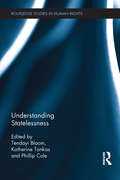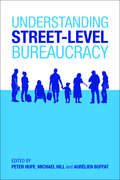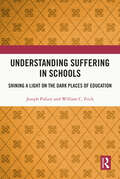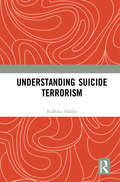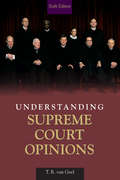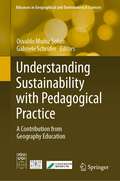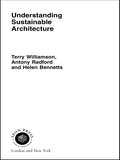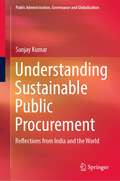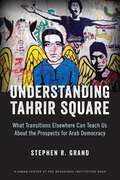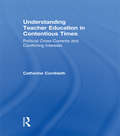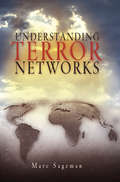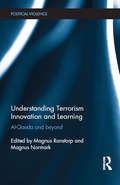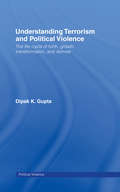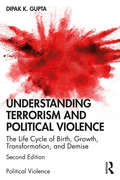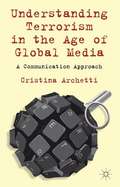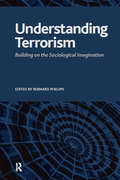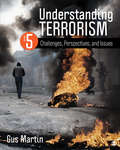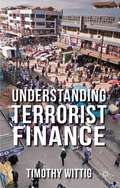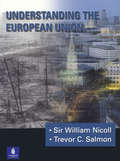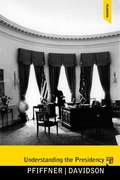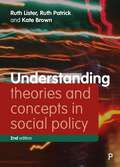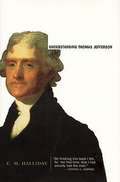- Table View
- List View
Understanding Statelessness (Routledge Studies in Human Rights)
by Tendayi Bloom, Katherine Tonkiss and Phillip ColeUnderstanding Statelessness offers a comprehensive, in-depth examination of statelessness. The volume presents the theoretical, legal and political concept of statelessness through the work of leading critical thinkers in this area. They offer a critique of the existing framework through detailed and theoretically-based scrutiny of challenging contexts of statelessness in the real world and suggest ways forward. The volume is divided into three parts. The first, ‘Defining Statelessness’, features chapters exploring conceptual issues in the definition of statelessness. The second, ‘Living Statelessness’, uses case studies of statelessness contexts from States across global regions to explore the diversity of contemporary lived realities of statelessness and to interrogate standard theoretical presentations. ‘Theorising Statelessness’, the final part, approaches the theorisation of statelessness from a variety of theoretical perspectives, building upon the earlier sections. All the chapters come together to suggest a rethinking of how we approach statelessness. They raise questions and seek answers with a view to contributing to the development of a theoretical approach which can support more just policy development. Throughout the volume, readers are encouraged to connect theoretical concepts, real-world accounts and challenging analyses. The result is a rich and cohesive volume which acts as both a state-of-the-art statement on statelessness research and a call to action for future work in the field. It will be of great interest to graduates and scholars of political theory, human rights, law and international development, as well as those looking for new approaches to thinking about statelessness.
Understanding Street-Level Bureaucracy
by Michael Hill And Aurélien Buffat Peter HupeThis wide-ranging edited volume provides a state of the art account of theory and research on modern street-level bureaucracy, gathering internationally acclaimed scholars to address the varying roles of public officials who fulfill their tasks while interacting with the public. These roles include the delivery of benefits and services, the regulation of social and economic behavior, and the expression and maintenance of public values. Questions about the extent of discretionary autonomy and the feasibility of hierarchical control are discussed in depth, with suggestions made for the further development of research in this field. Hence the book fills an important gap in the literature on public policy delivery, making it a valuable text for students and researchers of public policy, public administration and public management.
Understanding Suffering in Schools: Shining a Light on the Dark Places of Education
by William C. Frick Joseph PolizziDrawing inspiration from Dr. Willi Schohaus’s classic text The Dark Places of Education, this book contributes to the discussion by defining suffering in schools and providing a survey of the American school system’s inadequacies in the early twenty-first century. Through testimonies from former students on the ways they experienced suffering in school, this volume demonstrates how suffering can profoundly affect one’s academic growth and development—or worse. By analyzing the findings within a multidisciplinary ethical and educational framework, this volume presents a moral vision for understanding the role that suffering plays in school. Drawing on research in medicine, psychology, social sciences, religion, and education, this text weaves together many strands of thinking about suffering. This book is essential reading for academics, researchers, and postgraduate students in the fields of educational leadership, foundations of education, and those interested in both the history of education and critical contemporary accounts of schooling.
Understanding Suicide Terrorism
by Radhika HalderUnderstanding Suicide Terrorism aims to explore the different aspects involved in suicide terrorism for a better understanding of the tactic which has become a global phenomenon and threat today. The book aims to help inform holistic policy making by tracing the evolution of the use of suicide as a weapon in conflict and the emergence of modern-day suicide terrorism. The book uses case studies of prominent terror outfits to have used the tactic rather confidently and consistently and suggests that suicide terrorism must be understood as the interplay of three vital components—the individual committing the act, the organization employing the tactic and, the state environment contributing to the culture of suicide terrorism. Subsequently, a purely weapons-based approach to counter terrorism cannot be relied upon to solve a threat such as suicide terrorism which is so deeply ingrained in ideology and symbolism. The book comes at a time when suicide terrorism has been one of the most potent and effective tools for individuals and entities to achieve what they perceive as goals and shall inevitably remain a challenge for policy makers and security establishments to deal with. Please note: Taylor & Francis does not sell or distribute the Hardback in India, Pakistan, Nepal, Bhutan, Bangladesh and Sri Lanka
Understanding Supreme Court Opinions
by Tyll Van GeelGoing beyond the standard interpretation of Supreme Court opinions, this practical text delves into the legal reasoning behind the written opinions - the modes of persuasion and justification used by Supreme Court justices - to give readers a deeper understanding of how to read and interpret the decisions of our highest court. An indispensable supplement to any constitutional law casebook, the sixth edition has been thoroughly updated, incorporating new material throughout the book on recent opinions issued by the Supreme Court. It also includes a new Chapter 9, which discusses in greater depth the briefing of a case - Seattle School District No. 1;- and its analysis.
Understanding Sustainability with Pedagogical Practice: A Contribution from Geography Education (Advances in Geographical and Environmental Sciences)
by Osvaldo Muñiz Solari Gabriele SchrüferThis book shares with an international audience of teachers, scholars, and policymakers the experience of pedagogical practices to facilitate sustainability in the world. Sustainability is seen here as a journey toward the end state of sustainable development. Therefore, the authors contribute different roads to engage teachers and students with pedagogical discourse. Overall, the book demonstrates the value of powerful knowledge through action-oriented learning based on a bottom-up process. Consequently, pedagogical practices are understood as the instructional approaches based on a social constructivist model in which active learning is performed with student-to-student engagement. Secondary teachers in social sciences and university professors in geography find the study to be a valuable source of stimulation for incorporating new ideas and resolving common problems in their learning and teaching environments. Education policymakers around the world also benefit from the only publication that presents international perspectives on geographical knowledge related to sustainability.The contributing authors are experienced scientists in the field of geography education who are giving special attention to pedagogical practices that promote new directions toward sustainable thinking.This book is the first outcome of an international collaboration officially established in 2023 between the Department of Geography and Environmental Studies at Texas State University and the Department of Geography at the University of Bayreuth.
Understanding Sustainable Architecture
by Antony Radford Helen Bennetts Terry WilliamsonUnderstanding Sustainable Architecture is a review of the assumptions, beliefs, goals and bodies of knowledge that underlie the endeavour to design (more) sustainable buildings and other built developments. Much of the available advice and rhetoric about sustainable architecture begins from positions where important ethical, cultural and conceptual issues are simply assumed. If sustainable architecture is to be a truly meaningful pursuit then it must be grounded in a coherent theoretical framework. This book sets out to provide that framework. Through a series of self-reflective questions for designers, the authors argue the ultimate importance of reasoned argument in ecological, social and built contexts, including clarity in the problem framing and linking this framing to demonstrably effective actions. Sustainable architecture, then, is seen as a revised conceptualisation of architecture in response to a myriad of contemporary concerns about the effects of human activity. The aim of this book is to be transformative by promoting understanding and discussion of commonly ignored assumptions behind the search for a more environmentally sustainable approach to development. It is argued that design decisions must be based on both an ethical position and a coherent understanding of the objectives and systems involved. The actions of individual designers and appropriate broader policy settings both follow from this understanding.
Understanding Sustainable Public Procurement: Reflections from India and the World (Public Administration, Governance and Globalization #21)
by Sanjay KumarThis book explores the development of sustainable public procurement (SPP) as a strategic policy instrument to support decoupling of economic growth from environmental degradation and enhancing social well-being. Offering an in-depth case study of India’s SPP implementation trajectory, it discusses the challenges of integrating sustainability criteria into purchasing decisions, and examines policy choices and best practices to address them. It investigates the legislative, institutional, and governance framework for SPP in India, and identifies priority actions to accelerate wider uptake of SPP policy and practices. Furthermore, the book highlights the evolving role of SPP policies in response to emerging global mega trends, such as international trade, low carbon economy, circular economy, and Industry 4.0. Given its scope, this book appeals to scholars of economics, public administration, and environmental and social sciences, as well as to policymakers, practitioners, and advocates interested in steering transformational changes towards mainstreaming sustainable procurement practices in developing economies at the desired scale."This book comes at the right time to compensate for the lack of in-depth works on the origins, nature and reality of the implementation of sustainable purchases.”- Farid Yaker, Programme Officer, Sustainable Public Procurement, Economy Division, UNEP, Paris, France. “…If you are a procurement or sustainability professional anywhere in the world, please read this book. It will change the way you think and feel about your profession.”- Shaun McCarthy OBE, Chair, Supply Chain Sustainability School, London, UK & Director, Action Sustainability, London, UK
Understanding Tahrir Square
by Stephen R. GrandAmid the current turmoil in the Middle East, Understanding Tahrir Square sounds a rare optimistic note. Surveying countries in other parts of the world during their transitions to democracy, author Stephen Grand argues that the long-term prospects in many parts of the Arab world are actually quite positive. If the current polarization and political violence in the region can be overcome, democracy will eventually take root. The key to this change will likely be ordinary citizens--foremost among them the young protestors of the Arab Spring who have filled the region's public spaces--most famously, Egypt's Tahrir Square.The book puts the Arab Spring in comparative perspective. It reveals how globalization and other changes are upending the expectations of citizens everywhere about the relationship between citizen and state. Separate chapters examine the experiences of countries in the former Eastern bloc, in the Muslim-majority states of Asia, in Latin America, and in Sub-Saharan Africa during the recent Third Wave of democratization. What these cases show is that, at the end of the day, democracy requires democrats.Many complex factors go into making a democracy successful, such as the caliber of its political leaders, the quality of its constitution, and the design of its political institutions. But unless there is clear public demand for new institutions to function as intended, political leaders are unlikely to abide by the limits those institutions impose. If American policymakers want to support the brave activists struggling to bring democracy to the Arab world, helping them cultivate an effective political constituency for democracy--in essence, growing the Tahrir Square base--should be the lodestar of U.S. assistance.
Understanding Tahrir Square
by Stephen R. GrandAmid the current turmoil in the Middle East, Understanding Tahrir Square sounds a rare optimistic note. Surveying countries in other parts of the world during their transitions to democracy, author Stephen Grand argues that the long-term prospects in many parts of the Arab world are actually quite positive. If the current polarization and political violence in the region can be overcome, democracy will eventually take root. The key to this change will likely be ordinary citizens-foremost among them the young protestors of the Arab Spring who have filled the region's public spaces-most famously, Egypt's Tahrir Square.The book puts the Arab Spring in comparative perspective. It reveals how globalization and other changes are upending the expectations of citizens everywhere about the relationship between citizen and state. Separate chapters examine the experiences of countries in the former Eastern bloc, in the Muslim-majority states of Asia, in Latin America, and in Sub-Saharan Africa during the recent Third Wave of democratization. What these cases show is that, at the end of the day, democracy requires democrats.Many complex factors go into making a democracy successful, such as the caliber of its political leaders, the quality of its constitution, and the design of its political institutions. But unless there is clear public demand for new institutions to function as intended, political leaders are unlikely to abide by the limits those institutions impose. If American policymakers want to support the brave activists struggling to bring democracy to the Arab world, helping them cultivate an effective political constituency for democracy-in essence, growing the Tahrir Square base-should be the lodestar of U.S. assistance.
Understanding Teacher Education in Contentious Times: Political Cross-Currents and Conflicting Interests
by Catherine CornblethUnderstanding Teacher Education in Contentious Times examines how public, professional, and private or corporate agencies operate to shape teacher education and possibilities for its improvement. Teacher education programs, particularly those leading to state certification or licensure, are influenced not only by state regulations but also by required review and accreditation by an outside agency such as the National Council for the Accreditation of Teacher Education, and are subject to various contextual pressures such as the cultures of the institutions that host them and their surrounding communities, their potential student and employer markets, strong individuals, professional organizations, history or tradition, and, increasingly, external, usually privately-funded, special interest corporations such as the National Council on Teacher Quality. Unique among books on teacher education, this volume interweaves—in historical context including emerging trends—the complex contexts in which practice and reform efforts take place and are supported or impeded.
Understanding Terror Networks
by Marc SagemanFor decades, a new type of terrorism has been quietly gathering ranks in the world. America's ability to remain oblivious to these new movements ended on September 11, 2001. The Islamist fanatics in the global Salafi jihad (the violent, revivalist social movement of which al Qaeda is a part) target the West, but their operations mercilessly slaughter thousands of people of all races and religions throughout the world. Marc Sageman challenges conventional wisdom about terrorism, observing that the key to mounting an effective defense against future attacks is a thorough understanding of the networks that allow these new terrorists to proliferate. Based on intensive study of biographical data on 172 participants in the jihad,Understanding Terror Networksgives us the first social explanation of the global wave of activity. Sageman traces its roots in Egypt, gestation in Afghanistan during the Soviet-Afghan war, exile in the Sudan, and growth of branches worldwide, including detailed accounts of life within the Hamburg and Montreal cells that planned attacks on the United States. U. S. government strategies to combat the jihad are based on the traditional reasons an individual was thought to turn to terrorism: poverty, trauma, madness, and ignorance. Sageman refutes all these notions, showing that, for the vast majority of the mujahedin, social bonds predated ideological commitment, and it was these social networks that inspired alienated young Muslims to join the jihad. These men, isolated from the rest of society, were transformed into fanatics yearning for martyrdom and eager to kill. The tight bonds of family and friendship, paradoxically enhanced by the tenuous links between the cell groups (making it difficult for authorities to trace connections), contributed to the jihad movement's flexibility and longevity. And although Sageman's systematic analysis highlights the crucial role the networks played in the terrorists' success, he states unequivocally that the level of commitment and choice to embrace violence were entirely their own. Understanding Terror Networkscombines Sageman's scrutiny of sources, personal acquaintance with Islamic fundamentalists, deep appreciation of history, and effective application of network theory, modeling, and forensic psychology. Sageman's unique research allows him to go beyond available academic studies, which are light on facts, and journalistic narratives, which are devoid of theory. The result is a profound contribution to our understanding of the perpetrators of 9/11 that has practical implications for the war on terror.
Understanding Terrorism Innovation and Learning: Al-Qaeda and Beyond (Political Violence)
by Magnus Ranstorp and Magnus NormarkThis book examines the role of terrorist innovation and learning in theory and practice, and in the context of three specific EU case-studies. It is often said that terrorist groups are relatively conservative in character operating in a technological vacuum – relying almost exclusively on bombs and bullets. This observation masks increasing complexity and creativity and innovation within terrorist groups and one of the most distinguishing features of al-Qaeda’s terrorist operations is its propensity for remarkable innovation. This book examines how and why terrorist groups innovate more generally and al-Qaeda-related terrorist plots in Europe more specifically. The starting point for this book was twofold. Firstly to examine the issue of innovation and learning more generically both in theory, within specific themes and within the context of al-Qaeda’s influence on this process. Secondly, this book examines the evolution of specific al-Qaeda-related plots in three specific northern EU states – the United Kingdom, Denmark and Germany - where there has been a significant volume of planned, failed and executed terrorist plots. In particular, these case studies explore signs of innovation and learning. This book will be of much interest to students of terrorism and counter-terrorism, political violence, security studies and IR in general.
Understanding Terrorism and Political Violence: The Life Cycle of Birth, Growth, Transformation, and Demise (Political Violence)
by Dipak K. GuptaThis book explains the lifecycle of terrorist organizations from an innovative theoretical perspective, combining economics with social psychology. It provides a new approach to understanding human behaviour in organized society, and then uses this to analyze the forces shaping the lifecycle of violent political movements. Economic and rational-choice theorists assume that human beings are motivated only by self-utility, yet terrorism is ultimately an altruistic act in the eyes of its participants. This book highlights the importance of the desire to belong to a group as a motivating factor, and argues that all of us face an eternal trade-off between selfishness and community concern. This hypothesis is explored through four key groups; the IRA in Northern Ireland, Al Qaeda, Hamas, and the Naxalites in India. Through this, the book analyzes the birth, growth, transformation and demise of violent political movements, and ends with an analysis of the conditions which determine the outcome of the war against terrorism. Understanding Terrorism and Political Violence will be essential reading for advanced students of terrorism studies and political science, and of great interest to students of social psychology and sociology.
Understanding Terrorism and Political Violence: The Life Cycle of Birth, Growth, Transformation, and Demise (Political Violence)
by Dipak K. GuptaThis book provides a multidisciplinary approach to understanding human behavior and uses it to analyze the forces shaping the life cycle of violent political movements. This new edition has been revised and updated, with three new chapters being added. The 2nd edition takes us deeper inside human motivations, which cause otherwise rational people to join dissident groups, willing to kill and be killed. In doing so, the book draws upon research on brain science, evolutionary biology, and social psychology to help explain pathological collective behavior. From the motivations of individual participants, the book turns to the evolution of terrorist groups by venturing into theories of organizational development. Together, these theories explain the life cycle – the birth, growth, transformation from an ideological group to a criminal syndicate, and demise -- of a dissident organization. These hypotheses are supported with detailed case studies of three disparate terrorist movements: the nationalists of the IRA, the communist Naxalites of India, and the religious fundamentalists of al-Qaeda and ISIS. The book’s theory leads to an explanation of the current global trend of rising tribalism and authoritarianism. The author warns that this latest wave of xenophobia and authoritarianism is likely to be exacerbated by climate change and the consequent rise in sea-levels, which could displace millions from the areas least able to mitigate the effects of global warming to the countries that can. This book will be essential reading for students of terrorism studies, and of great interest to students of social psychology, political science and sociology.
Understanding Terrorism in America (Extremism and Democracy)
by Christopher HewittChristopher Hewitt's comprehensive book surveys the characteristics and causes of terrorism and governmental responses to it. He also examines the organizational structure of terrorist networks, how they are financed and their ideological agendas. Groups covered include: Islamic fundamentalists, white and black racists, black nationalists, revolutionary communists, neo-Nazis, militant Jewish groups, anti-abortionists and émigré groups. This book is essential reading for students of American politics and terrorism. It also provides a highly readable account for interested readers wishing to know more about a topic which has recently become tragically relevant to world affairs.
Understanding Terrorism in the Age of Global Media
by Cristina ArchettiWe cannot truly understand - let alone counter - terrorism in the 21st century unless we also understand the processes of communication that underpin it. This book challenges what we know about terrorism, showing that current approaches are inadequate and outdated, and develops a new communication model to understand terrorism in the media age.
Understanding Terrorism: Building on the Sociological Imagination
by Bernard S PhillipsTwo fundamental problems within the social sciences are the failure to integrate the existing segments of knowledge and a very limited ability to point out directions for solving social problems, given that lack of integrated knowledge.This volume illustrates the integrated work of seven sociologists to reverse this situation not only for the problem of terrorism but also for any substantive or applied problem. C. Wright Mills in The Sociological Imagination castigated the failure to integrate social science knowledge, and this volume carries forward his efforts to analyze human complexity.To understand and confront terrorism we require not only the integration of social science knowledge bearing on that problem, as illustrated by these authors. We also require the integration of that knowledge with the understanding of those on the front lines in order to connect the dots of specialized basic and applied knowledge, which this volume makes possible.
Understanding Terrorism: Challenges, Perspectives, and Issues
by Dr Gus MartinUnderstanding Terrorism: Challenges, Perspectives, and Issues offers a multidisciplinary, comprehensive exploration of contemporary terrorism that helps readers develop the knowledge and skills they need to critically assess terrorism in general and terrorist incidents. The Fifth Edition has been comprehensively updated with new information on terrorist incidents, evolving terrorist environments, and emerging perspectives on counterterrorism and security. Author Gus Martin provides a fresh analysis of violent extremism throughout, with discussions of both international and domestic challenges and options. Focused discussion is provided on contemporary threats, new movements and tendencies, and the effectiveness of responses to these scenarios. Profiles are provided of prominent individuals, including updated information on longstanding extremist personalities. Discussion of policies and responses to terrorist environments has been augmented to include new perspectives on counterterrorist options, comparisons of domestic and international scenarios, and the contexts of promoting regional and national security. The effectiveness of policy options is discussed within the contexts of international threat scenarios, as well as domestic scenarios, including regional security challenges and responses.
Understanding Terrorist Finance
by Timothy WittigWittig presents the first unified coherent framework for the systematic analysis of terrorist finance. With empirical examples from around the globe, he dispels several popular myths about these activities to make an important step forward in our understanding of not only terrorist finance, but also the place of terrorism in the contemporary world.
Understanding The European Union
by William Nicoll Trevor SalmonThis is an up-to-date account of how the European Union works, including developments since the introduction of the Treaty on European Union, the modifications introduced since the Treaty of Amsterdam and the preparations for economic and monetary union and enlargement. It focuses on how the EU is structured and operates, and has a review of the nature and operations of the major policies.
Understanding The Presidency Seventh Edition
by Roger H. Davidson James P. PfiffnerUpdated in its 7th edition, Understanding the Presidency provides readers with a blend of classic and contemporary readings on the presidency to ground and expand their knowledge of the highest office in the land. The new edition gives readers the analytical tools needed to make sense of the modern presidency.
Understanding The US Constitution (Documenting Early America)
by Sally Isaacs Baron BedeksyThe United States Constitution is arguably the most important document in America. Full color photos and thrilling text makes learning about the different branches of government and the document that forged them fun for young readers.
Understanding Theories and Concepts in Social Policy (Understanding Welfare: Social Issues, Policy and Practice)
by Kate Brown Ruth Lister Ruth PatrickDemonstrating the relevance of theory to political and policy debates and practice, this lively and accessible second edition helps students to grasp the real-life implications of social policy theory. The updated text includes consideration of contemporary shifts in welfare ideologies in the context of global austerity and the UK Coalition and Conservative governments since 2010. With a new chapter focusing on critical debates about disability, sexuality and the environment, this textbook also includes fresh reflections on migration, conditionality, resilience, social justice and human rights. Key features include: • real-life examples from UK and international politics and policy to explain and illuminate the significance of social policy theory; • key questions for student reflection and engagement; and • bulleted chapter summaries and annotated further readings at the end of every chapter. This new edition is a dynamic, engaging and valuable introduction to the key theoretical perspectives and concepts deployed in social policy.
Understanding Thomas Jefferson
by E. M. HallidayRecent biographies of Thomas Jefferson have stressed the sphinx-like puzzles of his character-famous champion of freedom yet lifelong slaveholder, foe of miscegenation yet secret lover of a beautiful slave for 30 years, aristocrat yet fervent advocate of government by the people. E. M. Halliday's absorbing and lucid portrait recognizes these and other puzzles about this great founder, but shows us how understandable they can be in light of his personal and social circumstances. Halliday takes readers deep into Jefferson's private life-exploring his childhood, his literary taste, and his unconventional religious thinking and moral philosophy. Here, too, are his adamant opinions on women, the evolution of his ideas on democracy and freedom of expression, and fresh insights into his relationship with Sally Hemings. A longtime senior editor of American Heritage, E. M. Halliday is the author of a memoir of the poet John Berryman and an account of the Allied invasion of Soviet Russia in 1918-19, as well as a number of articles for The New Yorker.
